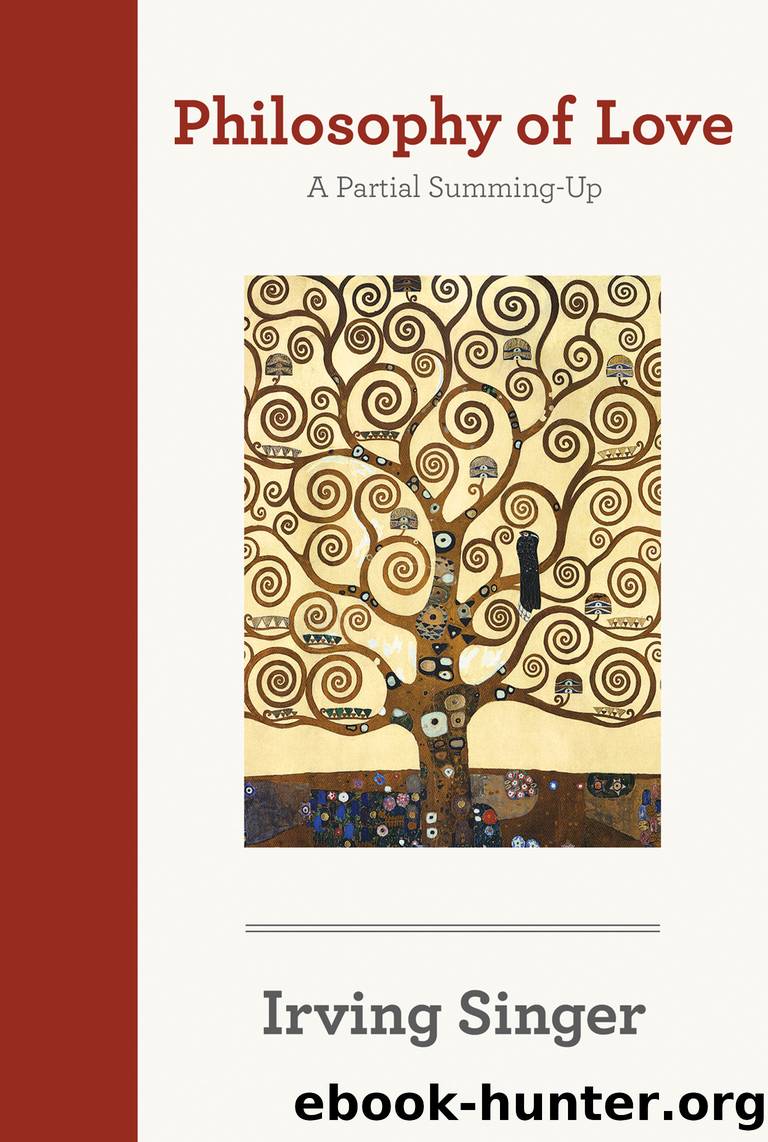Philosophy of Love by Irving Singer;

Author:Irving Singer;
Language: eng
Format: epub
Publisher: MIT Press
Published: 2009-06-15T00:00:00+00:00
Schopenhauer and Nietzsche
In considering the prospects for the requisite harmonization, I return to the history of ideas about love, and specifically the work of Nietzsche and Schopenhauer. They have to be studied together. Nietzsche was enamored of Schopenhauerâs philosophy when he was young. Schopenhauer died in 1860, so Nietzsche couldnât have known him personally, but having studied his philosophy he considered himself a Schopenhauerian. He glorifies Schopenhauer as the hero of his first book, The Birth of Tragedy Out of Music. Schopenhauerâs ideas then recur in later books that Nietzsche wrote.
As Nietzsche got older, however, he repudiated more and more details of Schopenhauerâs doctrine. He eventually ended up as a critic and not a devotee, which is a healthy development in any philosopher. It is the way that history marches on. Each new generation has to digest the ideas of previous ones, but then progressively eliminate much of what will now seem to them to be excrement. In the case of Nietzsche, his dialectic with Schopenhauer is particularly instructive because it reveals his own weaknesses as well as his unique strength of mind.
For instance, in Nietzscheâs final stage of emancipation, he remarks that Schopenhauer called himself a pessimist, which Nietzsche thought confused and counterproductive in various waysâone of which appears in the fact, according to Nietzsche, that Schopenhauer didnât live the life of a pessimist. âDo you know how Schopenhauer spent his day?â he says in effect in one of his later books. âHe had a good breakfast, did his writing in the morning, and in the afternoon he went for a walk with his poodle.â Incidentally, by the end of his life, Schopenhauer, who lived alone with his dogs, had twenty-four poodles. His lodgings contained photographs of them all on the walls. âAfter his walk,â Nietzsche continues, âSchopenhauer came home, ate a big meal, and then passed the evening playing on the flute. Thatâs not what it is to be a pessimist!â
In response, Schopenhauer would have replied that thatâs exactly what it is to be a pessimist, since if you are one, you donât expect too much of the world, you donât try to live in accordance with very high, remote, wonderful, but unrealistic ideals that nobody can satisfy, and therefore you donât inflict pain upon yourself because of your imperfections. Once you realize that you have fallen short of such ideals, you simply accept yourself as you are and garner pleasures along the way as best you can. You adapt to the reality of this being a world without a God (both Schopenhauer and Nietzsche were atheists), a world without any fundamental meaning and wholly propelled by what later science would call a mere field of energy. There is no prior plan or metaphysical intelligence to be deciphered. Existence is a function of what Schopenhauer called the âWill,â by which he meant the dynamic force in nature itself.
The outlines of this view were accepted by Nietzsche as much as by Schopenhauer. The latter believed that if youâre a pessimist you can adjust to the situation much better than if youâre an optimist.
Download
This site does not store any files on its server. We only index and link to content provided by other sites. Please contact the content providers to delete copyright contents if any and email us, we'll remove relevant links or contents immediately.
The remains of the day by Kazuo Ishiguro(9000)
Tools of Titans by Timothy Ferriss(8398)
Giovanni's Room by James Baldwin(7347)
The Black Swan by Nassim Nicholas Taleb(7131)
Inner Engineering: A Yogi's Guide to Joy by Sadhguru(6797)
The Way of Zen by Alan W. Watts(6615)
The Power of Now: A Guide to Spiritual Enlightenment by Eckhart Tolle(5784)
Asking the Right Questions: A Guide to Critical Thinking by M. Neil Browne & Stuart M. Keeley(5775)
The Six Wives Of Henry VIII (WOMEN IN HISTORY) by Fraser Antonia(5516)
Astrophysics for People in a Hurry by Neil DeGrasse Tyson(5191)
Housekeeping by Marilynne Robinson(4449)
12 Rules for Life by Jordan B. Peterson(4307)
Ikigai by Héctor García & Francesc Miralles(4275)
Double Down (Diary of a Wimpy Kid Book 11) by Jeff Kinney(4273)
The Ethical Slut by Janet W. Hardy(4258)
Skin in the Game by Nassim Nicholas Taleb(4250)
The Art of Happiness by The Dalai Lama(4130)
Skin in the Game: Hidden Asymmetries in Daily Life by Nassim Nicholas Taleb(4007)
Walking by Henry David Thoreau(3963)
